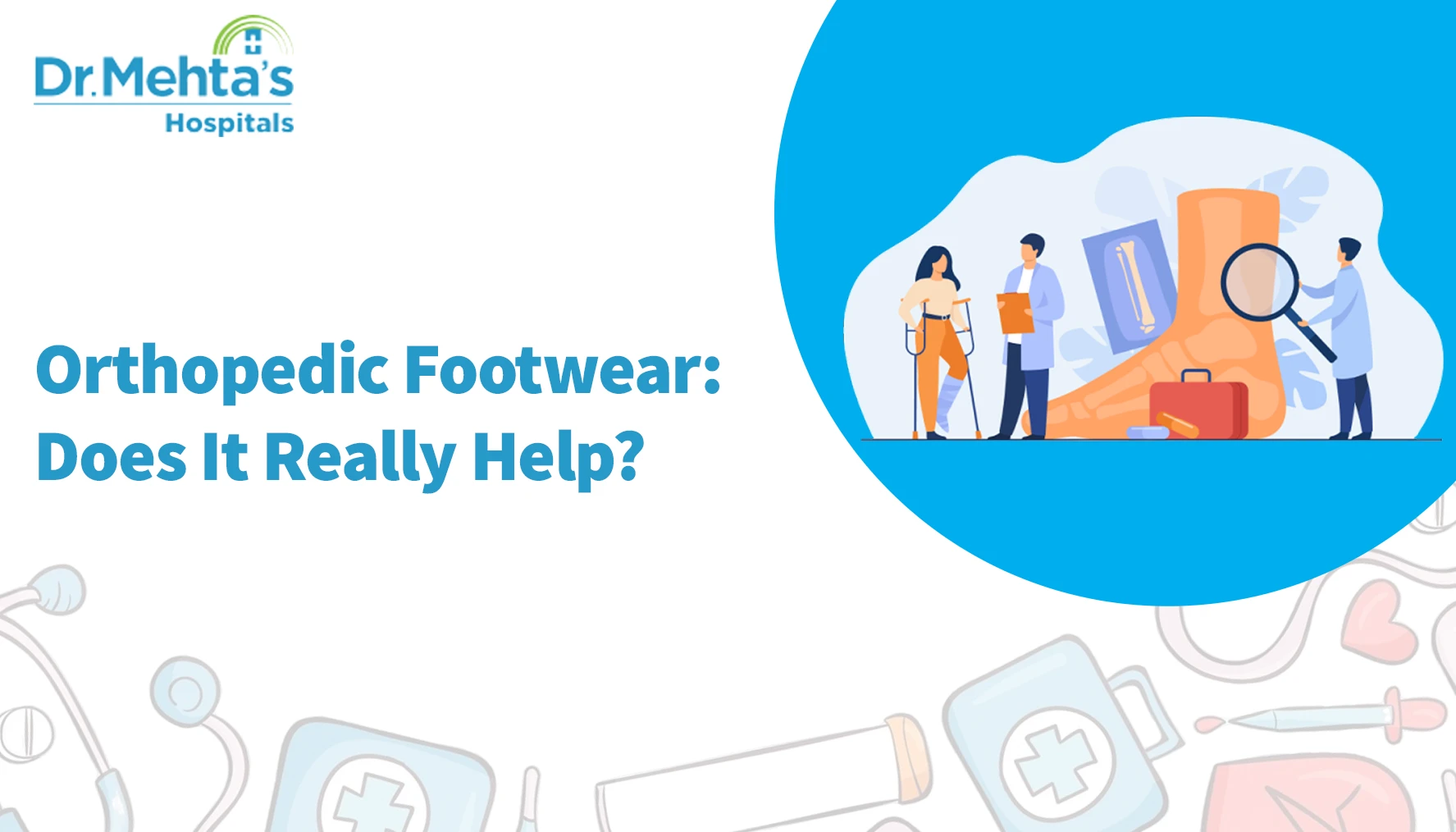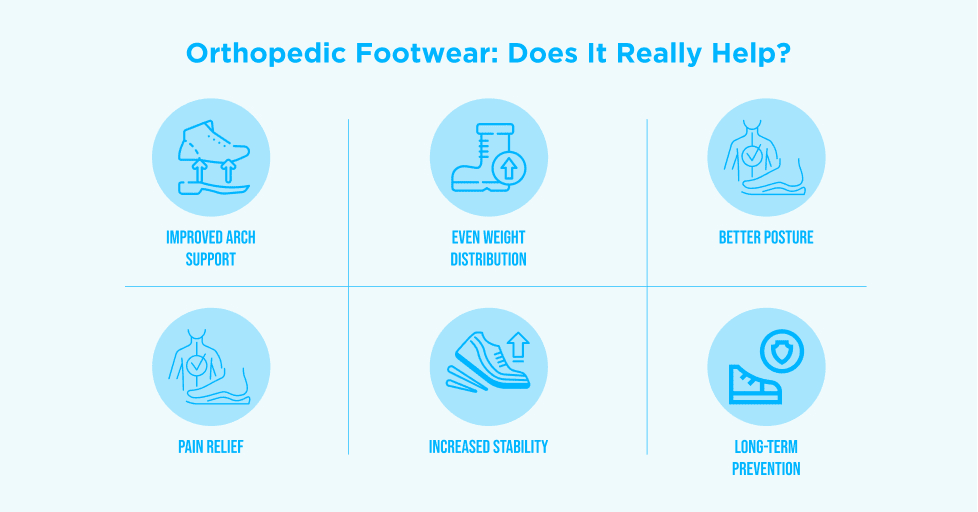Table of Contents

Your overall health is closely linked to your foot health. Regardless of whether you are recovering after an injury, have chronic pain, or want to prevent future issues, appropriate footwear can work wonders. Many people with foot, ankle, or leg problems are recommended orthopedic footwear, but they often wonder whether it really works. In this blog post, we will look at what orthopedic shoes are, how they work, and when they may be the correct choice of footwear, with the help of our orthopedic experts in Chennai.
Orthopedic footwear is designed to support the structure and function of the foot, ankle, and leg, and can also be custom-made if needed. The purpose of these shoes is:
They are also often specially designed to accommodate different foot shapes, with a custom arch support, cushioned soles, adjustable straps or laces, unlike regular shoes.
There are numerous reasons why people wear orthopedic footwear:
A study among Indian medical students found that 11.6% had bilateral flat feet and 3% had unilateral flat feet, highlighting that structural foot issues can appear even in younger adults.
It is one of the reasons why many individuals begin searching for supportive footwear early in order to safeguard their long-term joint health. For personalized advice, you can consult our orthopedic doctors at Chetpet.

Orthopedic shoes provide comfort while also supporting better health:
There are reports of up to 66 percent of Indians experiencing some form of back-related issues at some stage in their lives; one viable solution to this is to wear supportive and well-fitted footwear, which is one of the ways of avoiding putting unnecessary pressure on the back. If you experience sudden foot pain or injury, you may require urgent care. Our experienced doctors are available 24/7 through our emergency support services.
Not necessarily. Orthopedic shoes can be life-altering to those with structural problems or diagnosed conditions, but other healthy-footed individuals may fare well in good supportive regular shoes. The key is proper assessment, so you don’t end up buying footwear your feet don’t actually need. At our best hospital in Chennai for foot pain, our specialists carefully evaluate your walking pattern, areas of pain, and how you go about your daily engagements before prescribing alternatives.
While regular shoes are mostly about looks or basic comfort, orthopedic shoes are built for lasting comfort and therapeutic support.
| Feature | Regular Shoes | Orthopedic Footwear |
| Fit | Standard sizes | Custom/adjustable fit |
| Support | Minimal arch support | Enhanced arch and heel support |
| Purpose | Style/sports | Therapeutic comfort and alignment |
| Cost | Lower | Higher (specialized design) |
Though the benefits are significant, bear in mind:
A skilled clinician can assist you in achieving comfort, function, and aesthetics.
While their purpose is to improve comfort and support, orthopedic shoes are often misjudged. Such myths may even discourage individuals from using shoes that can possibly assist them in their mobility and general foot health. At our orthopedic doctors in Velappanchavadi, we want you to have the correct information so that you make intelligent decisions regarding your feet. Here are some common myths about orthopedic shoes:
It could be helpful when:
Always consult with an orthopedic specialist before purchasing. You can book a consultation with us.
Orthopedic footwear can be a valuable aid to individuals with foot pain, post-injury rehabilitation, or other orthopedic-related issues. Although not essential for everyone, the right pair can improve comfort, posture, and mobility, as recommended by a qualified orthopedic specialist. Along with supportive footwear, incorporating simple joint-friendly exercises can further reduce stiffness and improve mobility over time
It’s important to choose footwear based on your personal needs, not just self-diagnosis. Our orthopedic doctors in Chennai at Dr. Mehta’s Hospitals give you the right advice to make the right decision. Contact us here to learn more or book an appointment.
1) Can orthopedic shoes prevent foot problems?
They can lower risk by improving alignment and reducing pressure on vulnerable areas.
2) Are custom-made shoes better than ready-made?
Custom shoes suit complex issues; ready-made options work for mild to moderate needs.
3) How long do orthopedic shoes last?
Typically, it is 1–2 years with regular use, depending on materials and wear pattern.
4) Can I use orthopedic insoles instead of shoes?
Often, yes. Insoles can upgrade supportive regular shoes. Severe cases may still need orthopedic footwear.
5) Do I have to wear them all day?
Not always. Your doctor will suggest a schedule based on your condition and comfort.
Table of Contents
Recent Post
About us
Dr. Mehta’s Hospitals is a leading multispecialty hospital in Chennai with over 90 years of excellence. With 400+ beds and 80+ specialties, its Chetpet and Velappanchavadi centers offer advanced, state-of-the-art, compassionate care under one roof.
Chetpet Contact Details
Velappanchavadi Contact Details
Feel free to ask your queries on
Our Specialities
About us
Dr. Mehta’s Hospitals is a leading multispecialty hospital in Chennai with over 90 years of excellence. With 400+ beds and 80+ specialties, its Chetpet and Velappanchavadi centers offer advanced, state-of-the-art, compassionate care under one roof.
Chetpet Contact Details
Velappanchavadi Contact Details
Feel free to ask your queries on
Our Specialities
Quick Links
Center Of Excellence